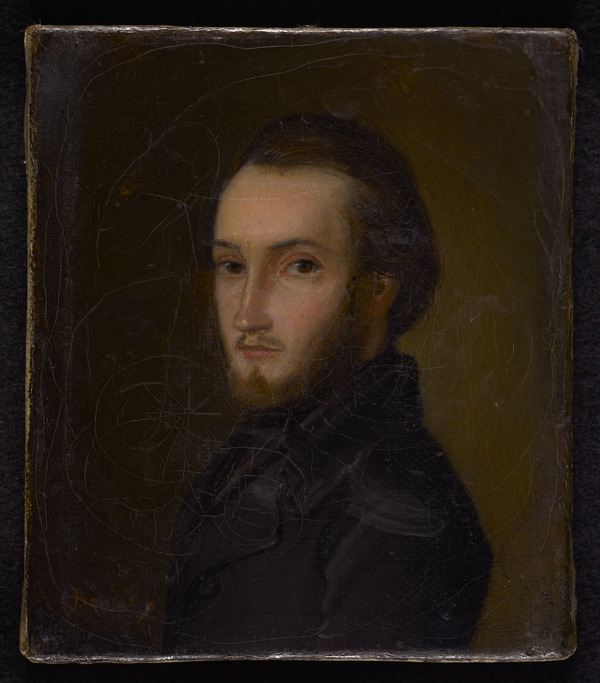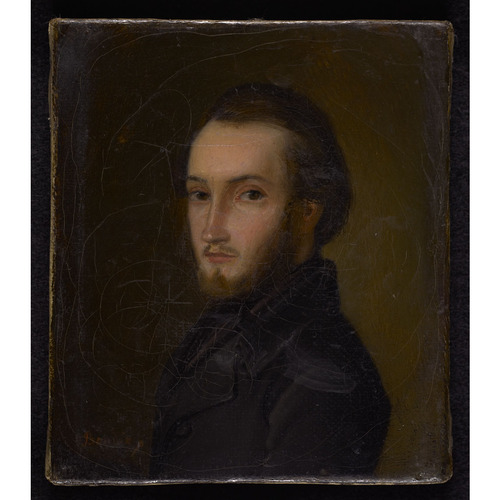LÉVESQUE, GUILLAUME (baptized Louis-Guillaume), office holder, Patriote, lawyer, and author; b. 31 Aug. 1819 in Montreal, son of Marc-Antoine-Louis Lévesque, a protonotary, and Charlotte-Mélanie Panet, daughter of Judge Pierre-Louis Panet*; d. unmarried 5 Jan. 1856 at Quebec.
Guillaume Lévesque was a direct descendant of François Lévesque*, who had been a member of the first Legislative Council in 1775 and who died at Quebec in 1787. Guillaume was six years old when his father, who had been stricken with paralysis, had to take his doctor’s advice to stay in the country for a period and moved with his family to Berthier-en-Haut (Berthierville). In 1830 young Guillaume joined his brother Charles-François Lévesque at the Petit Séminaire de Montréal, where he studied for six years. He had not completed his program there when – in 1835, it appears – he was articled to Édouard-Étienne Rodier*, a Montreal lawyer; he continued his legal studies the following year with Hippolyte Guy. In May 1837 he was appointed a record clerk in the office of the sheriff of Montreal.
Caught up in the rebellion of 1837–38, Lévesque joined the Association des Frères-Chasseurs [see Robert Nelson*]. He also linked up with a group of Patriotes from Napierville. On 9 and 10 Nov. 1838 he took part in the attack on Odelltown, which ended with the defeat of the Patriotes. Arrested on 14 November, he was put in jail at Montreal. At the trial, which began on 24 December, he stood accused with 11 Patriotes, including Pierre-Théophile Decoigne* and Achille-Gabriel Morin*, “of having conspired with others in the parish of Saint-Cyprien to overthrow the legislative government established in Lower Canada,” and was the only one to plead guilty. Witnesses for the prosecution, several of them leading citizens of Napierville, admitted at the court martial that they had recognized him among a group of Patriotes, but swore that he was not armed. Beginning on 29 December witnesses for the defence, in particular François-Roch de Saint-Ours, Jean-Roch Rolland*, and Pierre Rastel* de Rocheblave, testified in court “that they had known the accused and his family for a long time, that he had been well brought up and had always shown a quiet disposition. That his father, [being] ill, for many years had been unable to attend to the education of his children. That his family was one of the most respectable in the land.” The court martial was unmoved: Lévesque was found guilty on 2 January and sentenced, like his companions, to death. He was again incarcerated in the Montreal jail, but through the influence of Philippe Panet, a relative who was an eminent supporter of the government, his sentence was commuted in September 1839 on condition that he leave the country, as his letter of thanks to Pierre-J. Beaudry, the clerk of the prison, confirms.
Lévesque then took refuge in France, initially with his father’s relatives in Normandy, the Lévesque-Besselières and the Lévesque-Lemaîtres. From there he went to Paris where, under the assumed name of Guillaume d’Ailleboust de Ramesay, he entered the foreign ministry and worked for three years as a translator in the department dealing with Spanish and Portuguese affairs. He also took courses in medicine, anatomy, and law, and in 1843 worked at the Institut d’Afrique and the Société de Géographie de France. It is thought that for the rest of his life he remained a contributor to the annals of the latter learned society, and that some of his articles attracted attention although they went unnoticed in Lower Canada. Lévesque was pardoned in 1843, and returned to Lower Canada on 21 November of that year. He was called to the bar on 10 May 1844, but gave up practice to take a post as French translator in the Translation Bureau of the Legislative Assembly of the Province of Canada; he soon became its head, and he retained this position until his death.
Lévesque engaged in a great variety of intellectual activities. On 24 Nov. 1844 he helped found at Montreal the Société des Amis, and he served as its president in 1847 and 1848. Its members sought to “educate themselves and to encourage the arts and the sciences”; they had two meetings a week, and were required, on pain of a fine, to make a creative contribution each month to one of the four designated sections of the society. Lévesque made such a presentation at least once. On 1 Feb. 1845 he published in L’Album littéraire et musical de la Revue canadienne, established to disseminate the studies of the society’s members, a text entitled “De l’habitude de saluer les passants.” It was subsequently reprinted by James Huston in his Répertoire national, along with a speech Lévesque made on 29 Jan. 1848 to the members of the Institut Canadien in Montreal, “De l’influence du sol et du climat sur le caractère, les établissements et les destinées des Canadiens.” Although there is no proof, it would not be surprising if Lévesque had collaborated with his friend Huston in selecting and compiling the texts in the Répertoire national. He published in L’Écho des campagnes at the end of 1846 and the beginning of 1847 a historical short story, “Vœux accomplis,” set in the American revolution, and then on 18 and 25 Nov. 1847 “La croix du Grand Calumet,” the first written version of the legend of one Cadieux, a voyageur who was abandoned on an island when his companions escaped from the Iroquois through the intervention of a white woman, and who died on the day he was discovered.
Guillaume Lévesque passed away suddenly on 5 Jan. 1856 at Quebec, at the age of 36. A funeral liturgy was sung two days later at the cathedral of Notre-Dame in the presence of numerous friends. He was buried on 11 January at Sainte-Mélanie, where his mother had gone to live on the death of her husband. Le Canadien reported on 7 January that Lévesque was “one of those men whose death is regretted as much because of their personal merit as by reason of the rare talents and distinguished works which gave lustre to their career.” Le National of 8 January observed that he was “distinguished as much by his upright character, his talents, and his education, as by the trials amid which he was cast by the destinies of politics, and which he traversed with the dignity befitting courageous souls and generous hearts alike.” If Lévesque can be reproached for not having written and published more, it must be acknowledged that he had a lively, sustained style, a polished, exact language, and a great love for his country and its inhabitants.
[Guillaume Lévesque is the author of the essay “De l’habitude de saluer les passants,” published first in Album littéraire et musical de la Rev. canadienne (Montréal) in 1845 and subsequently in Le répertoire national (Huston, 1848–50; 1893), and of a lecture given in 1848 at the Institut canadien de Montréal entitled “De l’influence du sol et du climat sur le caractère, les établissements et les destinées des Canadiens,” also printed in Le répertoire national. In addition, Lévesque published two short stories, “Vœux accomplis” and “La croix du Grand Calumet,” in L’Écho des campagnes (Québec), from 12 Dec. 1846 to 9 Jan. 1847 and on 18 and 25 Nov. 1847 respectively. The descriptive passages on the Ottawa River in “La croix du Grand Calumet” and on the crossing of the St Lawrence by canoe in December in “Vœux accomplis” merit inclusion in an anthology. a.b.]
ANQ-M, CE1-51, 31 août 1819; CE5-8, 12 janv. 1856. ANQ-Q, E17/31, no.2448; E17/32, nos.2502–4, 2543–44; E17/37, no.2969; E17/39, no.3114; E17/40, nos.3158, 3198; P1000-65-1291. Centre de recherche en civilisation canadienne-française (Ottawa), Fonds Guillaume Lévesque. PAC, MG 30, D1, 19: 106; RG 68, General index, 1841–67: 219. Guillaume Lévesque, “[Lettre de Guillaume Lévesque à Pierre Beaudry],” ANQ Rapport, 1926–27: 289. L’Avenir, 29 janv. 1848. Le Canadien, 7 janv. 1856. La Minerve, 27 janv. 1848. Le National (Québec), 8, 15 janv. 1856. F.-J. Audet, “Commissions d’avocats de la province de Québec, 1765 à 1849,” BRH, 39 (1933): 592. DOLQ, 1: 261, 770–71. Fauteux, Patriotes, 302–3. J.-J. Lefebvre, “Brevets de cléricature des avocats de Montréal au deuxième quart du xixe siècle,” La Rev. du Barreau, 14 (1954): 312. P.-G. Roy, Les avocats de la région de Québec, 279. Michel Boucher, “Les œuvres de Charles Lévesque, écrivain oublié du dix-neuvième siècle (1817–1859)” (thèse de ma, univ. Laval, Québec, 1972), iv–viii. Maurault, Le collège de Montréal (Dansereau; 1967). P.-G. Roy, La famille Panet (Lévis, Qué., 1906). Marthe Faribault-Beauregard, “L’honorable François Lévesque, son neveu Pierre Guérout et leurs descendants,” SGCF Mémoires, 8 (1957): 13–30. Jacques Gouin, “La traduction au Canada de 1791 à 1867,” Méta (Montréal), 12 (1977): 26–32. L.-A. Huguet-Latour, “La Société des amis,” BRH, 8 (1902): 121–22. J.-J. Lefebvre, “François Levêque (1732–1787), membre des Conseils législatif et exécutif,” BRH, 59 (1953): 143–45. Victor Morin, “Clubs et sociétés notoires d’autrefois,” Cahiers des Dix, 15 (1950): 185–218.
Cite This Article
Aurélien Boivin, “LÉVESQUE, GUILLAUME (baptized Louis-Guillaume),” in Dictionary of Canadian Biography, vol. 8, University of Toronto/Université Laval, 2003–, accessed December 31, 2025, https://www.biographi.ca/en/bio/levesque_guillaume_8E.html.
The citation above shows the format for footnotes and endnotes according to the Chicago manual of style (16th edition). Information to be used in other citation formats:
| Permalink: | https://www.biographi.ca/en/bio/levesque_guillaume_8E.html |
| Author of Article: | Aurélien Boivin |
| Title of Article: | LÉVESQUE, GUILLAUME (baptized Louis-Guillaume) |
| Publication Name: | Dictionary of Canadian Biography, vol. 8 |
| Publisher: | University of Toronto/Université Laval |
| Year of publication: | 1985 |
| Year of revision: | 1985 |
| Access Date: | December 31, 2025 |




